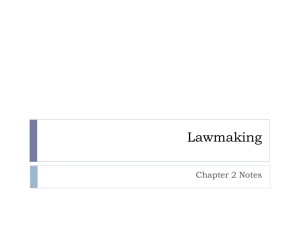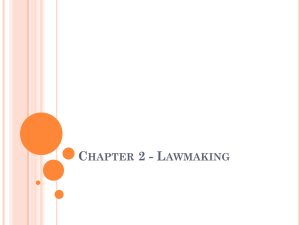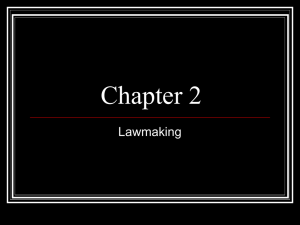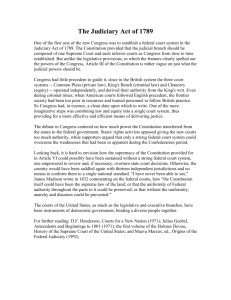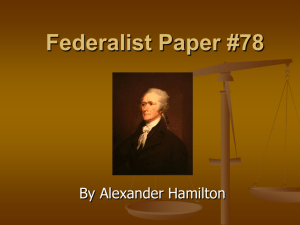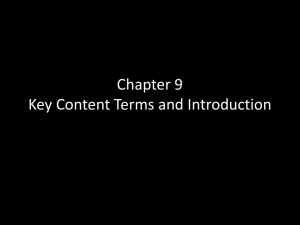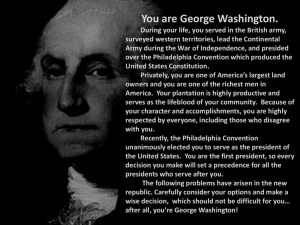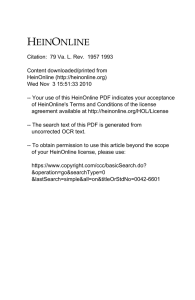Agencies Con't - Hillsboro City Schools
advertisement
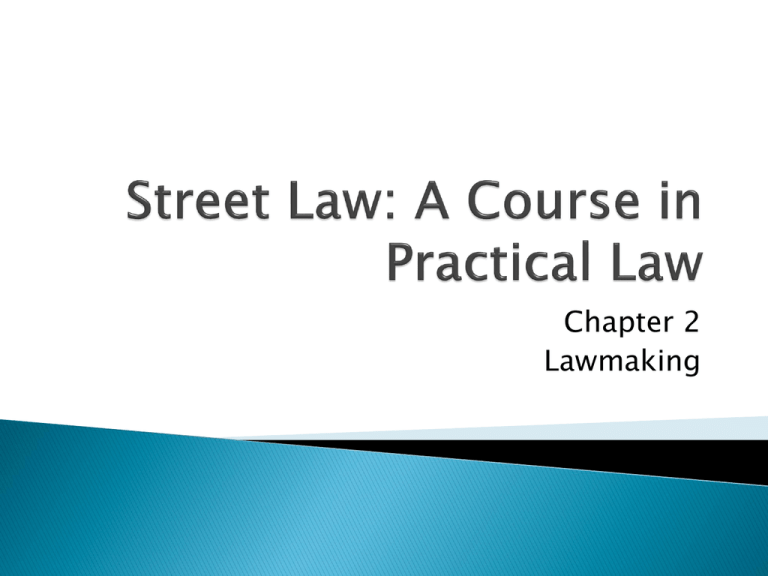
Chapter 2 Lawmaking The US Congress is made up of two houses: ◦ The Senate: 100 members, two from each state ◦ The House of Representatives: 435 members, each state represented according to the size of its population The US Constitution gives Congress the power to pass laws that are binding on the people in every state. States have the power to pass laws that apply within their boundaries. Federal statues deal with issues of national impact, such as: ◦ Environmental quality, national defense, labor relations, veterans’ affairs, public health, civil rights, economic development, postal services, and federal taxes. States pass laws with statewide impact in such areas as: ◦ Education, traffic, state taxes (including how they will be spent), marriage and divorce, most criminal laws, and the power and duties of state government officials. In 1779, John Adams was quoted, “Ours is a government of laws, not men.” How do you interpret this quote? Can you identify examples of governments of men instead of laws? The power of the federal government to pass laws is limited. ◦ Congress cannot legislate unless given the power to do so in the Constitution. The states, on the other hand, have broader power to legislate. ◦ In general the states have power to legislate in all those areas over which the national government was not granted power by the Constitution. For example: a state could not enter into a treaty with another country or coin money, as those are among the powers assigned to the national government. However, states can pass marriage and divorce laws, as those are not powers assigned to the national government. Sometimes federal laws conflict with sate laws. Unless it can be shown that Congress is legislating in an area the Constitution delegated to the states, the courts will usually follow the federal and not the state law. For example: In the 1960s, federal laws against racial segregation in restaurants and hotels came into conflict with laws of some states that required separate accommodations for blacks and whites. ◦ The courts ruled the state laws invalid based on Article VI of the Constitution, the supremacy clause. ◦ This states, “the Constitution and the Laws of the United States…shall be the supreme law of the land.” In addition to the US Congress and state legislatures, cities, towns, and counties have lawmaking bodies. ◦ These are called county or city councils, boards of alderman, local boards of education, or other names. Laws passed by local governments apply only to a county, city, or town. ◦ The local lawmaking body has been given the power to enact ordinances by the state. Many of the laws most important to us in our daily lives are passed by local governments Legislatures and other lawmaking bodies try to respond to the needs of the citizens they represent by introducing legislation in the form of bills. Federal State Local Student must label five accurate facts about the differences between the Federal and State Governments Students must also have three facts that are similar between the Federal and State Governments Student must label two accurate facts about local government The Road Map must be done in color and as neat as possible. This is a 100 point assignment. For you to get a perfect score, All information must be correct, neatly labeled, and colorful. Each wrong piece of information will deduct 5 points. Legislatures and other lawmaking bodies try to respond to the needs of the citizens they represent by introducing legislation in the form of bills. Bills are used to enact new laws or amend or repeal old laws. Ideas for bills can come from legislatures, the executive branch, individual citizens, or citizens’ groups. After a bill becomes a law, the people must obey it. Sometimes, though, the language of a law is open to differing interpretations. It is not always easy to know exactly what a law prohibits or allows. ◦ Can you think of a time in your life that would be similar to what has been described above? Disputes over what a law means frequently end up in court. A judge who interprets what the legislature means is determining legislative intent. Nothing relieves headache pain faster than Bayer. Son, I’ll hold the nail, you hold the hammer. When I nod, you hit it. Anyone leaving their garments here for more than 30 days will be disposed of. Toilet out of order, please use floor below. Automatic washing machines: Please remove all of your clothes when the lights go out. And for the grand finale, A sign found outside a local golf course states, “Anyone found collecting golf balls on this course will be prosecuted and have their balls removed” Despite these efforts, many laws are difficult to read and understand. When this occurs, one of the basic purpose of law—letting citizens know what conduct is expected of them—is lost. When judges decide what a statute means, they must follow certain rules: ◦ One rule is that courts will not enforce laws that are so vague that it is unclear exactly what conduct is prohibited. Think about how this classroom would be managed if I enforced rules that were to vague. ◦ Another rule says that if there is doubt as to the meaning of a word in a criminal statute, the word must be strictly interpreted against the government. ◦ Clarity in legal language is important. Legislative bodies usually deal with problems only in a general way. The legislative bodies authorize administrative agencies to develop rules and regulations to make laws more specific. For example: Congress passed a law requiring safe working conditions in places of employment. To implement the law, Congress established the Occupational Safety and Health Administration (OSHA). This agency develops specific regulations governing health and safety on the job. These regulations dictate specifics, such as the height of guardrails in factories, the number of fire exits, and the type of safety equipment to be worn by employees in various occupations. Administrative agencies are really hidden lawmakers, making numerous rules and regulations that affect business and industry, as well as individuals. ◦ Local agencies can influence anything from a restaurant having the ability to serve alcohol and/or feature live music. For example: Regulations govern the amount of pesticide that can be used on produce, the number of animals that can be killed by hunters, the ingredients that can be used in canned food, the costs of phone calls and electricity, the hours of operation for bars and restaurants, the qualifications of people employed in various professions, and hundreds of other subjects. Regulations issued by these agencies become law without going through legislative committees or votes. However, agencies usually hold public hearings before issuing proposed regulations. ◦ These hearings give individuals or businesses an opportunity to express their views on the proposal. Some examples of public hearings would be proposed budget concerns or comprehensive land use plans for a county. Law is also made by courts. Imagine the court room scenes you have watched on television. ◦ These courts were conducting trials. ◦ The person who loses a trial can sometimes ask a higher court to review and change the result of the trial. The higher courts that are called to review and change the result of previous trials are appeals or appellate courts. When an appeals court decides a case, it issues a written opinion that sets a precedent for similar cases in the future. ◦ A precedent is defined as something done or said that may serve as an example or rule to authorize or justify a subsequent act of the same or an analogous kind All lower courts in the place where the precedent was issued must follow it. For example: If a state’s supreme court ruled that the state’s constitution required that school funding be equalized throughout the state—richer and poorer school districts would each have to spend the same amount per student—then all lower courts in that state would have to follow that precedent. The law seems clear, but some disputes have arisen over its interpretation. Interpret the law in the following cases, keeping in mind what the law says and well as the intent. Decide whether or not the vehicle described should be allowed in the park. Each group must write down a reason that is different from another group’s reason on the poster. Students will keep their noise level from getting to loud and disrupting the activity.
